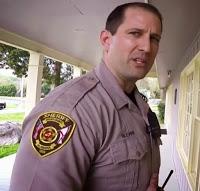
Virginia Emerson Hopkins
How did U.S. Judge Virginia Emerson Hopkins, who is so crooked she must squeak when she walks from all the oil and grease dripping off of her, get backed into a corner while trying to cheat us in "The Jail Case"? We invite you to come along for a step-by-step explanation of how an oily federal judge found herself with no ammunition and essentially threw up her hands by using the "We Just Disagree" card. (With apologies to English singer-songwriter Dave Mason, who surely did not record his 1970s hit "We Just Disagree" with the intention of it being used as a cover for judicial corruption.)Hopkins dismissed "The Jail Case" -- and wrongfully denied our Rule 59 Motion to Alter or Amend Judgment -- on two primary grounds: statute of limitations and state immunity. Let's take a look at her actions on those two issues. (All relevant documents to this post -- our complaint, Hopkins' dismissal order, our Rule 59 motion, two amendments to it, and Hopkins' Rule 59 order -- are embedded at the end of this post. The case currently is on appeal before the 11th Circuit.):
Statute of Limitations
(A) The ticking clock and the face of the complaint -- Shockingly, Hopkins does make at least one correct citation to law, and it comes on page 6 of her dismissal order: "“Dismissal under Federal Rule of Civil Procedure 12(b)(6) on statute of limitations grounds is appropriate only if it is apparent from the face of the complaint that the claim is time-barred.” La Grasta v. First Union Sec., Inc.,358 F.3d 840, 845 (11th Cir. 2004).
Just because Hopkins occasionally can make a correct statement of law, that does not mean she can correctly apply it to our case. Please hold that thought; it's important, and we will come back to it.
(B) What's that you're saying? -- Hopkins primary justification for dismissing our claim on statute of limitations grounds can be found on page 15 or her order: "Claims based on arrest and/or imprisonment pursuant to legal process accrue on the date of such arrest. Wallace v. Kato, 549U.S. 384, 397, 127 S. Ct. 1091, 1100, 166 L. Ed. 2d 973 (2007) (holding that the statute of limitations for a § 1983 claim seeking damages for false arrest begins to run at the time the claimant becomes detained pursuant to legal process)."

Dave Mason
In the first segment of that sentence, Hopkins absolutely butchers the U.S. Supreme Court (SCOTUS) finding in Kato. In fact, it's so bad that a reasonable person could wonder if she was drunk when she wrote it -- assuming she wrote it, which she probably did not; it likely was penned by a clerk in her office.First, Kato is about claims of FALSE arrest and FALSE Imprisonment, and Hopkins makes no mention of that in the first segment. More importantly, nowhere in Kato does it say a claim based on false arrest/imprisonment accrues on the date of the arrest.The second segment of Hopkins' sentence is a fairly accurate paraphrase of the Kato holding, as it applies to certain CRIMINAL cases. But was mine a criminal case -- in reality and on the face of the complaint? No, I was falsely arrested an imprisoned based on a civil case, for alleged defamation.
(C) What does Kato really say? -- We spell this out on page 8 of our Rule 59 motion:
For false imprisonment and its subspecies false arrest, "[t]he ... cause[ s ] of action ... provid[ing] the closest analogy to claims of the type considered here," Heck v. Humphrev, 512 U.S. 477, 484, 114 S.Ct. 2364, 129 L.Ed.2d 383, the statute of limitations begins to run when the alleged false imprisonment ends. sec, e.g., 4 Restatement (Second) of Torts§ 899."
The general rule in Kato is clear: The clock starts ticking on the statute of limitations when the alleged false imprisonment ends. There is no shortage of other authority that says the same thing.
(D) A matter of authority -- What do other authorities say on the accrual of the statute of limitations in a case alleging false arrest/false imprisonment? The issue already has been decided in the Northern District of Alabama, from a case styled James v. City of Birmingham (ND of AL, 2012):
"The running of the statute of limitations on false imprisonment is subject to a distinctive rule-dictated, perhaps, by the reality that the victim may not be able to sue while he is still imprisoned: 'Limitations begin to run against an action for false imprisonment when the alleged false imprisonment ends."' Wallace, 549 U.S. at 389 (quoting 2 H. Wood, Limitation of Actions§ 187d(4), p. 878 (rev. 4th ed. 1916).
What do you know, a judge in the Northern District of Alabama -- U.S. Magistrate John E. Ott can discern the actual law and apply it correctly. Maybe Hopkins could learn from him. She also could learn from reading other authorities, such as 4 Restatement (Second) of Torts § 899, which we cite on pages 2-4 of our first amendment to the Rule 59 motion:
“For false imprisonment, the statute [of limitations] begins to run only when the imprisonment ends, since the period of imprisonment is treated as a unit." Restatement (Second) of Torts;§ 899, (1979). See Wallace v. Kato, 549 U.S. at 389, 127 S. Ct. 1091. "The running of the statute of limitations on [common-law] false imprisonment is subject to a distinctive rule — dictated, perhaps, by the reality that the victim may not be able to sue while he is still imprisoned.").
Hopkins also could learn from When Statute of Limitations Begins to Run Against Action for False Imprisonment or False Arrest, 49 A.L.R. 2d 922 (2010), M.C. Dransfield, which we cite on page 4 of the first amendment:
For false imprisonment in particular, the authorities overwhelmingly hold that a cause of action for false imprisonment accrues on the discharge from imprisonment.
My discharge from imprisonment was on March 26, 2014, and our complaint was filed on March 26, 2016, meeting the two-year statute of limitations. It can't be seriously argued that our claims are untimely, but Hopkins tries anyway, even though she can make no accurate, valid citation to law that supports her ruling. Hence, she shrugs and says, "We just disagree."
(E) Land of confusion -- Why is there any confusion abut this? There shouldn't be, for anyone who has integrity and can read. But we probably can thank the late SCOTUS justice Antonin Scalia author of the Kato decision, for any confusion that surrounds this issue. While Scalia was revered on the right, the truth is that he was a shallow thinker, a poor writer, an enemy of civil and human rights, and a pawn for law enforcement and corporate America.
In the Kato opinion, Scalia cites the holding noted in items (C) and (D) above. But then, as was his tendency, he muddies the waters, with this (citations omitted):
The running of the statute of limitations on false imprisonment is subject to a distinctive rule — dictated, perhaps, by the reality that the victim may not be able to sue while he is still imprisoned: "Limitations begin to run against an action for false imprisonment when the alleged false imprisonment ends." Thus, to determine the beginning of the limitations period in this case, we must determine when petitioner's false imprisonment came to an end.
Reflective of the fact that false imprisonment consists of detention without legal process, a false imprisonment ends once the victim becomes held pursuant to such process — when, for example, he is bound over by a magistrate or arraigned on charges.
For good measure, here is the summary holding in Kato:
Held: The statute of limitations upon a § 1983 claim seeking damages for a false arrest in violation of the Fourth Amendment, where the arrest is followed by criminal proceedings, begins to run at the time the claimant becomes detained pursuant to legal process.
What does Scalia's muddled writing tell us? The petitioner (Wallace) in Kato was charged with a crime, and his arrest was followed by criminal proceedings, and he eventually was detained "pursuant to legal process." Scalia even gives examples of such legal process -- and they include being bound over to a magistrate or arraigned on charges.
None of that happened in my case because I was not arrested for a crime. There was no arraignment, I was not bound over to a magistrate, and there was no legal process. That takes us back to item (A), where Hopkins states (correctly) that a lawsuit can be dismissed on statute-of-limitations grounds only if it is "apparent from the face of the complaint that it is time-barred." That also takes us back to item (B), where Hopkins claims the statute of limitations began to run when I was held "pursuant to legal process."
But was there ever "legal process" in my case? Were there any criminal proceedings following my arrest on alleged "civil contempt" -- any arraignment, any appearance before a magistrate? The answer is no because I was not arrested for a crime. Even more importantly, the face of our complaint -- which you can see under the Factual Allegations section in Hopkins' order, starting at No. 25, never says I was subjected to criminal proceedings or legal process of any kind.

Chris Blevins
While I was in the Shelby County Jail, inmates told me I would go to a "72-hour hearing," where you are arraigned on charges, get a court date, etc. I went to a 72-hour hearing, with a bunch of other inmates, and never heard my name called for the alleged offense -- contempt of court related to a 100-percent civil matter. When I asked the magistrate about the contempt charge, for which I apparently was incarcerated, she said, "We don't have that in our records."Why? Well, this was a criminal proceeding -- the very thing Scalia mentioned in Kato -- and I was not arrested for a crime. To bring it closer to home, Hopkins claims I eventually was held pursuant to "legal process," but I was not -- and the face of our complaint never says I was. Hopkins finding that our complaint is time-barred is based on what lawyers call "assuming facts that aren't in evidence."
State immunity
Hopkins' claim that deputy Chris Blevins is immune from lawsuit for breaking into our home, beating me up, dousing me with pepper spray -- all for a non-criminal matter -- is, to borrow a crude phrase, "batshit crazy." And we make that clear in the second amendment to our Rule 59 motion, beginning on page 1:
The Alabama Supreme Court . . . has adopted a burden-shifting framework for establishing a right to immunity, per Ex parte Estate of Reynolds, 946 So. 2d 450 (Ala., 2006): “A defendant initially bears the burden of demonstrating that he was acting in a function that would entitle him to immunity.” In this case, the defendants hold the burden of proving they were acting within the line and scope of their employment, and they have not come close to doing that, making dismissal on this issue improper.
Alabama law goes even further:
In fact, the Alabama Supreme Court has held that a determination on immunity for deputies cannot be made without discovery, so again, dismissal is improper and outside the law. From Ex parte Haralson, 853 So. 2d 928 (Ala., 2009): “The Court cannot conclude, at this early stage of the proceedings, without evidence showing that at the time of the accident, [the deputy] was acting within the line and scope of his employment, that [the deputy] is entitled to immunity.” No such evidence has been produced in the instant case, so the Shelby County sheriff officials are not entitled to a finding in their favor on immunity. At this early point in the proceedings, they definitely are not protected by any form of state immunity.
Did the cops ever meet their burden of proving they were immune because they acted within the line and scope of their employment? Nope. Has there ever been any discovery on that issue, and has the cops' lawyer asked for discovery, which he should know is due, by law? Hell, no.
Do cops have a right to enter your home to make a non-criminal arrest? The answer is "absolutely not." Did the Alabama cops grossly violate my civil rights by beating me up inside my home? They absolutely did:
Speaking of warrants, the U.S. Supreme Court’s finding in Payton v. New York, 455 U.S. 537 (1980) “prohibits the police from making a warrantless and nonconsensual entry into a suspect's home in order to make a routine felony arrest." The deputies’ entry into the Shulers’ home was warrantless and nonconsensual and did not involve a criminal arrest, much less a felony arrest.”
Alabama law, per Ex parte Alabama Department of Youth Services, 880 So. 2d 393 (Ala. Supreme Court. 2003), spells out exceptions to immunity for law-enforcement officers:
Youth Services goes on describe exceptions to immunity for law-enforcement officers: “Notwithstanding anything to the contrary in the foregoing statement of the rule, a State agent shall not be immune from civil liability in his or her personal capacity: (1) when the Constitution or laws of the United States, or the Constitution of this State, or laws, rules, or regulations of this State enacted or promulgated for the purpose of regulating the activities of a governmental agency require otherwise; or (2) when the State agent acts willfully, maliciously, fraudulently, in bad faith, beyond his or her authority, or under a mistaken interpretation of the law.
Did Blevins and his thug colleagues act "maliciously," "in bad faith," "beyond his authority"? No one could seriously argue otherwise.
Hopkins' claim that the Alabama thugs are protected by immunity is preposterous -- probably enough to make Vladimir Putin wobbly. No wonder Hopkins took the lazy, easy route and played the "We Just Disagree" card. That's how crooked judges roll.
Let's close this out on a high note, with Dave Mason performing an acoustic version of 'We Just Disagree' -- with help from Rick Derringer (Edgar Winter, Steely Dan), Mark Farmer (Grand Funk Railroad), and Johnne Sambataro (Firefall):
